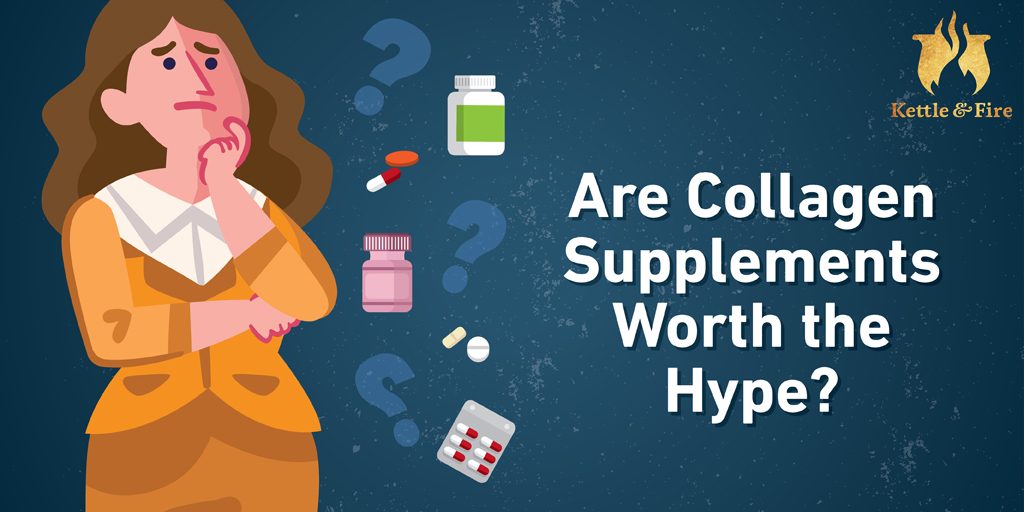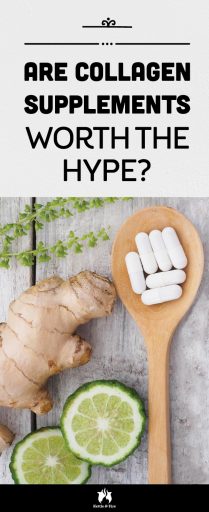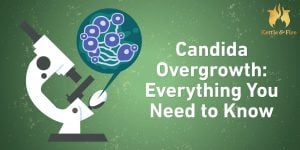Are Collagen Supplements Worth the Hype?

When you walk into any pharmacy or beauty supply, you’ll find dozens of anti-aging beauty products promising to rid your face of fine lines and wrinkles and reduce the appearance of saggy skin. Many of these products boast ingredients like collagen and hyaluronic acid, but contrary to popular belief, your skin doesn’t absorb collagen topically.
How Effective Are Collagen Supplements, Anyway?
Collagen, and its building blocks, should be consumed through a protein-rich diet. There are a number of collagen supplements on the market to help you get an adequate supply, but they range from $30-$50 dollars. We’ll help you understand the truth about these supplements before you drop the cash.
Collagen supplements, especially in the form of quick-dissolving powders that can be added to both hot and cold drinks, have taken the holistic health community by storm, with seemingly every celebrity doctor releasing one of their own. This easy-to-digest form of collagen is either called hydrolyzed collagen or collagen hydrolysate.
At first glance, a collagen supplement seems like the perfect solution if you’re looking to add more collagen to your diet. But there’s one problem: The jury is still out on whether or not supplemental collagen is as effective as consuming it in whole foods. We’ve done a little digging to help you decide if collagen supplements are right for you.
The Role of Collagen in Your Body
Before we launch into the pros and cons of collagen supplements, it’s important to understand what collagen is and why it’s so critical for skin and overall health. Collagen, the main structural protein in humans and other mammals, is made up of four amino acids: glycine, proline, hydroxyproline and arginine. Amino acids are the building blocks of all protein in your body, and these four contribute specifically to the production of healthy connective tissue, including the extracellular skin matrix. (1)
Collagen makes up 25-35 percent of all protein in your body. (2) There are five types of collagen, each responsible for the production of different elements of your body, including bones, joints, ligaments, tendons, skeletal and smooth muscle, hair, skin, nails, eyes and even internal organs. (1) Collagen acts as the “glue” that holds every part of your body together. As a major component of your skin’s make up, it also protects you from outside pathogens by reducing skin permeability. (2)
Collagen is also critical in protecting your gut lining. In a recent study, researchers found that collagen peptides significantly reduced gut permeability over the control group. (3)
As you age, your body produces less natural collagen, which can lead to joint pain, cellulite, saggy skin, fine lines and wrinkles. You also heal from injury more slowly with age, due in part, to lower collagen levels. (4) By including foods in your diet that jump-start collagen production, especially as you age, you can improve skin elasticity, optimize healing time in your body, and enjoy improved overall health.
The Importance of Dietary Collagen
While the human digestive process breaks down dietary collagen into its more simple constituents (the four amino acids we mentioned earlier), dietary collagen in the form of protein-containing foods can help increase your body’s collagen levels. These foods include eggs, dairy, fish, meat and bone broth.
This might cause alarm for the vegans among us, but rest assured, we have some suggestions for you as well. There are no vegan sources of natural collagen, but many of the amino acids needed for collagen production in the body can be found in the following foods:
- Cruciferous veggies (kale, cauliflower, broccoli)
- Legumes (beans and lentils, including fermented soy products such as seitan and tempeh)
- Pseudograins (quinoa)
- Nuts and seeds (pistachios, pumpkin seeds)
- Foods rich in vitamin C (citrus, bell peppers)
While it requires a more diverse list of foods to get adequate amino acids from fruits and vegetables, it’s certainly possible. But the question remains: Will collagen supplements work as well as these whole foods to provide you with the protective collagen you’re looking for? Let’s consider the facts.
Research on Collagen Supplements: Are They For You?
The truth is that the research on collagen supplements is thin. This is not to say that there’s no research supporting the claims that collagen supplements aid in joint and skin health. However, the studies that do support these claims are small or short-term. They do show promising results, however, which should motivate researchers to continue digging.
In a 24-week study measuring the effects of supplemental collagen hydrolysate on joint pain in 97 athletes, results showed significant improvements in every parameter measured. (5)
In a meta-analysis of eight studies on the effects of ingesting hydrolyzed collagen on skin health, all eight studies showed some form of improvement, although not statistically significant in every study. Studies measured skin elasticity and hydration in addition to the appearance of fine lines and wrinkles. (1)
In every study we reviewed, regardless of the source of collagen, there were no adverse side effects to collagen supplementation.
Should You Try It?
While the jury is still out on whether collagen supplements are completely effective, the research seems to be pointing in a positive direction. And with no reported negative side effects, it might not hurt to give a supplement a try.
The general options are either collagen powders or pills. Most collagen powders are completely flavorless, so you can easily add them to coffee, smoothies, or anything else you might sip throughout the day. The serving size is generally two tablespoons and adds between 18 and 20 grams of protein to your drink or soup of choice.
Because collagen products are made from animal parts, which can sometimes be contaminated by improper farming and ranching practices, it’s important to select a high-quality product. Supplements are not evaluated by the FDA, so search for collagen powders made from organic and pasture-raised animals that have been vetted by a neutral third party like the National Sanitation Foundation. This ensures the safety and quality of the supplement you choose.
Like other dietary supplements, collagen supplements are not a magic bullet. If you decide to try one, remember that the word supplement is meant to do just that — add on to a health-conscious diet and lifestyle. Be sure to include nutrient-dense foods in your diet plan to ensure that you’re doing everything you can to thrive.
For further reading, check out:
- What is Collagen Good for?
- Slow Cooker Bone Broth Recipes
- Top 5 Beauty Benefits of Collagen
- Key Differences Between Gelatin and Collagen










